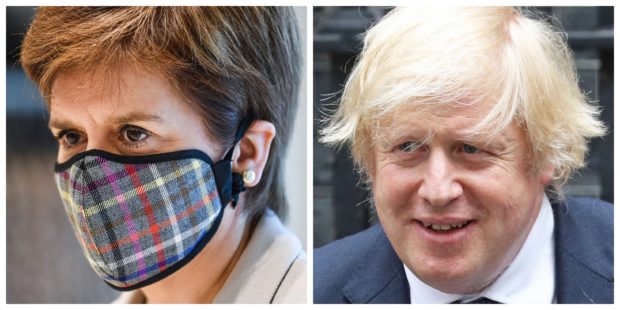
Nicola Sturgeon has labelled the UK Government’s decisions surrounding the so-called air bridges and travel quarantine as “shambolic”, amid ongoing disagreements between Holyrood and Westminster over the issue.
Speaking during her daily press conference, the First Minister said the Scottish Government will set out its own position on the matter in the next couple of days.
She said her government is “very likely” to agree to the UK Government’s newly-published list of ‘low-risk’ countries that it intends to remove from quarantine restrictions in England from 10 July.
However, Ms Sturgeon said that issues may arise when it comes to the places Westminster has listed as ‘medium-risk’.
She explained this is because some of those countries have a higher prevalence of the virus than Scotland currently has. She also pointed out that the virus prevalence in Scotland has been estimated to be five times lower than England.
“I think I can say now it is likely, very likely, that we will be able to agree the list of countries the UK has categorised as low-risk, although we will need to do a proper assessment of that,” said Nicola Sturgeon.
“But we need to take some particular care in our assessment of the risk categorised as medium-risk, because that is where there may be some countries that have a higher prevalence of the virus than Scotland does right now.”
NS: "But we need to take some particular care in our assessment of the list of countries that are being categorised as medium risk, because that is where there may be some countries that have a higher prevalence of the virus than Scotland does right now."
— The SNP (@theSNP) July 3, 2020
The present rules mean passengers arriving in the UK by plane, ferry or train – including UK nationals – are asked to provide an address where they will self-isolate for 14 days. Travellers can be fined £100 for failing to fill in a form with these details.
The UK Government’s list of more than 50 countries exempt from quarantine includes France, Spain, Germany and Italy. The full list – which will follow a ‘traffic light system’ – is expected to be released early on Friday afternoon.
The First Minister said it has been “very challenging” for Scotland to reach a position on the UK Government’s proposals to end quarantine for visitors from certain countries.
She said there had been “limited” communications between the two governments, and claimed the list of countries her administration was asked to sign up to on Thursday is not the same as the list today.
The First Minister said: “Just to illustrate the point (on) the shifting sands of the UK Government’s position – the list of countries that they were yesterday demanding that the Scottish Government sign up to, and suggesting we were a barrier to getting an agreement on, is not the same as the list they have shared with us today.
“When so much is at stake… we can’t allow ourselves to be dragged along in another government’s – to be quite frank about it – shambolic decision making process.”
She added: “We want to welcome visitors again from around the world and we also want to allow our own citizens to travel. We also want, if possible for obvious practical reasons, to have alignment on these matters with the rest of the UK.”
The judgements required to reach a decision are complex, Ms Sturgeon said, and need to be made “carefully and rationally” from both a public health and a legal perspective.
She said that, arguably, quarantining after travelling becomes more important rather than less important as levels of the virus reduce.
Nicola Sturgeon went on to recommend Scots travel within the country to support the local tourism sector at “a time when they have probably never needed that support more”.
It comes as the five-mile travel restriction was relaxed on Friday and self-contained holiday accommodation – such as cottages, lodges and caravans – reopened.

Enjoy the convenience of having The Sunday Post delivered as a digital ePaper straight to your smartphone, tablet or computer.
Subscribe for only £5.49 a month and enjoy all the benefits of the printed paper as a digital replica.
Subscribe